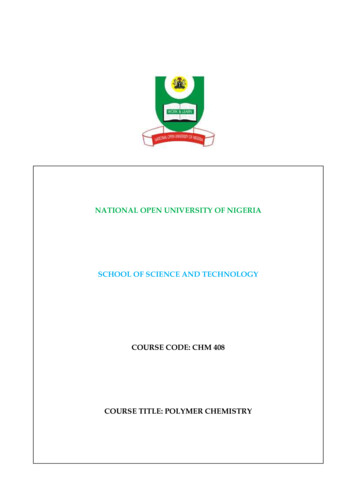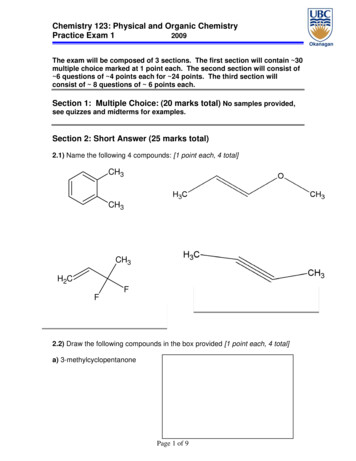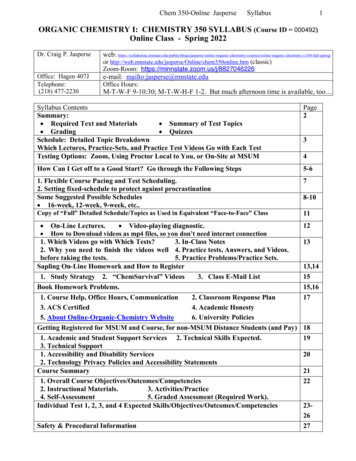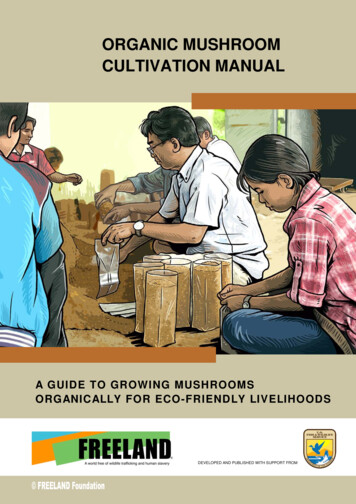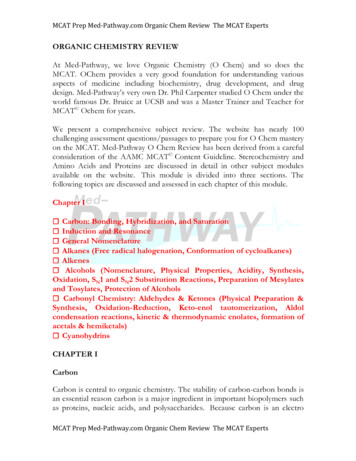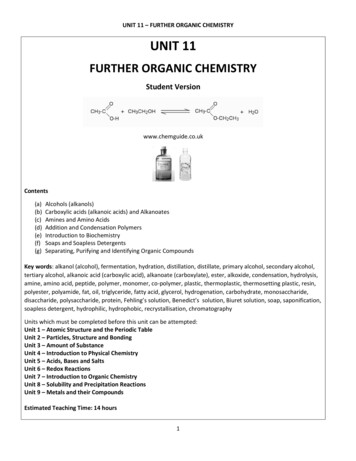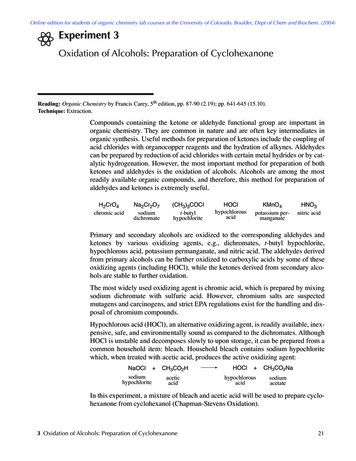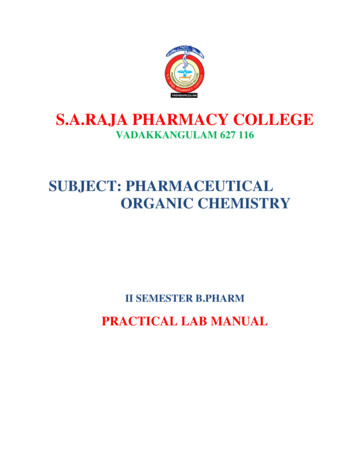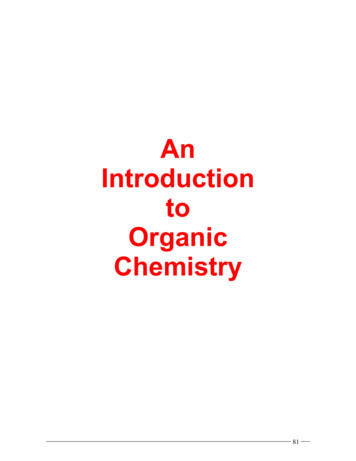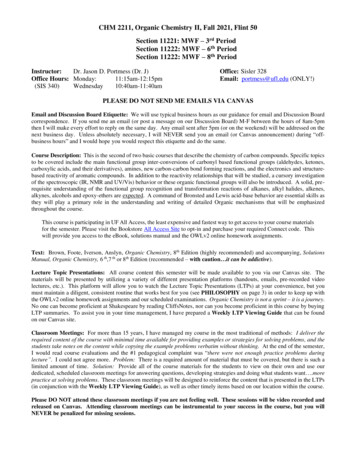
Transcription
CHM 2211, Organic Chemistry II, Fall 2021, Flint 50Section 11221: MWF – 3rd PeriodSection 11222: MWF – 6th PeriodSection 11222: MWF – 8th PeriodInstructor:Dr. Jason D. Portmess (Dr. J)Office Hours: Monday:11:15am-12:15pm(SIS 340)Wednesday10:40am-11:40amOffice: Sisler 328Email: portmess@ufl.edu (ONLY!)PLEASE DO NOT SEND ME EMAILS VIA CANVASEmail and Discussion Board Etiquette: We will use typical business hours as our guidance for email and Discussion Boardcorrespondence. If you send me an email (or post a message on our Discussion Board) M-F between the hours of 8am-5pmthen I will make every effort to reply on the same day. Any email sent after 5pm (or on the weekend) will be addressed on thenext business day. Unless absolutely necessary, I will NEVER send you an email (or Canvas announcement) during “offbusiness hours” and I would hope you would respect this etiquette and do the same.Course Description: This is the second of two basic courses that describe the chemistry of carbon compounds. Specific topicsto be covered include the main functional group inter-conversions of carbonyl based functional groups (aldehydes, ketones,carboxylic acids, and their derivatives), amines, new carbon-carbon bond forming reactions, and the electronics and structurebased reactivity of aromatic compounds. In addition to the reactivity relationships that will be studied, a cursory investigationof the spectroscopic (IR, NMR and UV/Vis) behavior or these organic functional groups will also be introduced. A solid, prerequisite understanding of the functional group recognition and transformation reactions of alkanes, alkyl halides, alkenes,alkynes, alcohols and epoxy-ethers are expected. A command of Bronsted and Lewis acid-base behavior are essential skills asthey will play a primary role in the understanding and writing of detailed Organic mechanisms that will be emphasizedthroughout the course.This course is participating in UF All Access, the least expensive and fastest way to get access to your course materialsfor the semester. Please visit the Bookstore All Access Site to opt-in and purchase your required Connect code. Thiswill provide you access to the eBook, solutions manual and the OWLv2 online homework assignments.Text: Brown, Foote, Iverson, Anslyn, Organic Chemistry, 8th Edition (highly recommended) and accompanying, SolutionsManual, Organic Chemistry, 6 th,7 th or 8th Edition (recommended – with caution it can be addictive).Lecture Topic Presentations: All course content this semester will be made available to you via our Canvas site. Thematerials will be presented by utilizing a variety of different presentation platforms (handouts, emails, pre-recorded videolectures, etc.). This platform will allow you to watch the Lecture Topic Presentations (LTPs) at your convenience, but youmust maintain a diligent, consistent routine that works best for you (see PHILOSOPHY on page 3) in order to keep up withthe OWLv2 online homework assignments and our scheduled examinations. Organic Chemistry is not a sprint – it is a journey.No one can become proficient at Shakespeare by reading CliffsNotes, nor can you become proficient in this course by buyingLTP summaries. To assist you in your time management, I have prepared a Weekly LTP Viewing Guide that can be foundon our Canvas site.Classroom Meetings: For more than 15 years, I have managed my course in the most traditional of methods: I deliver therequired content of the course with minimal time available for providing examples or strategies for solving problems, and thestudents take notes on the content while copying the example problems verbatim without thinking. At the end of the semester,I would read course evaluations and the #1 pedagogical complaint was “there were not enough practice problems duringlecture”. I could not agree more. Problem: There is a required amount of material that must be covered, but there is such alimited amount of time. Solution: Provide all of the course materials for the students to view on their own and use ourdedicated, scheduled classroom meetings for answering questions, developing strategies and doing what students want .morepractice at solving problems. These classroom meetings will be designed to reinforce the content that is presented in the LTPs(in conjunction with the Weekly LTP Viewing Guide), as well as other timely items based on our location within the course.Please DO NOT attend these classroom meetings if you are not feeling well. These sessions will be video recorded andreleased on Canvas. Attending classroom meetings can be instrumental to your success in the course, but you willNEVER be penalized for missing sessions.
Evaluation Items for the Semester1) Organic 1 Review Materials: For almost the last 10 years, I have provided multiple resources and practice aides to assiststudents in getting back up to speed from their Organic 1 layoff and varied backgrounds. The highly motivated student willtackle these documents as suggested – during week 1. The less motivated or overconfident student will entertain these itemsaround the time of the first exam (or not at all) which is obviously too late. Consequence: The student has put themselves ina position which can sometimes be impossible to recover. Solution: Make the review process required. These review itemsare available on our Canvas site on the Organic 1 Review Materials page. You will also find on this Canvas page the details(content and deadlines) for the “Organic 1 Review Materials” Assessment which will be worth 30 points towards your finalgrade. The items that you will find on this page are there for your practice (not for credit). I have even put together sometimed, practice Canvas Assessments to give you that funny feeling in your belly that you must manage during examinations.Again, these are not for graded credit – just for your practice. What will count for actual graded credit will be the “Organic1 Review Materials” Assessment that will be delivered via Canvas.Setting the tone early: In Spring 2021, the students that earned 27 or more points out of 30 had a final average in the class of75.4%. Those who scored less than 20pts on the “Organic 1 Review Materials” Assessment had a final average of 65.1%.Some of you understand how you got to this point while others blindly followed your phone’s GPS. If you are not sure whichgroup you belong to, then these Organic 1 Review Materials will help you decide. Don’t delay – The “Organic 1 ReviewMaterials” Assessment on Canvas is due on 9/1/2021 @11:55pm. More details will be sent via Canvas Announcements.2) OWLv2 Online Homework (70 pts): The primary design of the OWL system for our course is based on three basicprinciples: i) To ensure that you are routinely keeping up with the material with low to moderate difficulty assessments withlow stakes point values. ii) Weekly and multi-weekly assessments will be due to discourage binge watching the Lecture TopicPresentations (LTPs) and to incentivize that learning the material is more easily integrated in smaller, more manageable topics.Binge watching a whole season of Breaking Bad in a weekend is entertainment. The material of this course requires seriousthought while learning how to integrate it with past information. Learning without thinking is useless. Thinking withoutlearning is dangerous. iii) To give students who demonstrate minimal effort a path to receiving a minimal grade to pass thisclass. This is NOT a guarantee but as it turns out last semester, not a single student was unable to pass the class with a minimumgrade of “C” that earned at least 70% of the OWL credit. In most situations, you will be provided 3 attempts at a particularOWL topic. So, with proper preparation, effort and “attempts” management; the OWL portion of the course should not onlyallow you to learn from your mistakes, but it invariably should improve your final grade in the course as well. So often in life,the hard work we apply toward the pursuit of our goals is unrewarded. OWL is like doing push-ups. You put the time in –you will get the results.3) Exams: Progress/Assembly Exams 1-3 will be delivered “in-person” via a multiple choice/Scantron format on the following dates below.Room locations will be announced via Canvas. There is NO option for online examinations for this course.Exam #1:Exam #2:Exam #3:Tuesday, September 28thThursday, October 28thSaturday, December 11th(8:20pm – 9:50pm)(8:20pm – 9:50pm)(8:00pm – 9:30pm)Considerations for scheduling conflicts (religious holidays, higher ranking assembly exams,and university sponsored events) will be made but must be presented to the instructor 5 daysprior to the scheduled assessment.It is possible for you to earn up to 100 points for each exam. All assessments will be cumulative, but the emphasis (60-70%)of each assessment will be focused on unevaluated (“new”) material and 30-40% will be considered foundational (“old”)material. All language courses build on a solid foundation of fluency. Organic Chemistry is no different.Exam Absences: These will be handled in accordance with official UF academic regulations. For more information, ns/. Please read below for further clarification for the most commonsituations:(1) Conflicts with other events: Acceptable reasons to miss a scheduled exam include conflicting eveningexams in courses with higher course numbers, religious holidays, military obligations, special curricularrequirements (e.g., attending professional conferences), or participation in official UF sanctioned activities such asathletic competitions, etc.For more information on such absences see the official UF Policy s/attendance-policies/#absencestext ). If you must be absent foran exam due to a documented and approved conflict known in advance, you must e-mail your instructor the relevantdocumentation at least one week prior to the scheduled exam and an early conflict exam will be scheduled for you.
(2) Missing an exam due to an emergency or sudden illness: If you are absent for an exam due to anunpredicted documented medical reason or family emergency, you must contact the instructor within 24 hours ofthe missed assessment, and have your excuse verified by the Dean of Students Office (DSO). Your instructorwill follow UF academic regulations in evaluating the notification and/or documentation received by you and bythe DSO on your behalf. Once confirmed by your instructor, a make-up exam will then be scheduled. If yourdocumentation is deemed insufficient to excuse your absence you will receive a zero for the missed assessment.Grading: The final grade will be determined by the 3 exams (300 pts), the “Organic 1 Review Materials” Assessment (30 pts)and the OWLv2 Online Homework (70 pts) for a total of 400 possible points. I find in life it is best to exceed expectationsrather than relying on the performance of others to dictate outcome. Therefore, to earn the grade that you desire, you mustperform at a certain level. In other words, like the game of golf and life, you are competing against yourself and the course –not each other. Letter grades will be assigned based on the grading scale below:Grading ScaleA:A-:92.00 - 10087.00 - 91.99B :B:B-:83.00 - 86.9978.00 - 82.9972.00 - 77.99C :C:65.00 - 71.9958.00 – 64.99C- or lessbelow 57.99PHILOSOPHYAttendance: This course is not an attendance-based course but your success in this class will most certainly be determinedby your level of effort and discipline. Having said that, time spent is NOT an accomplishment. Simply spending a large amountof time on a subject will not make you an expert and it will not provide you the confidence to perform well on assessments.To be successful, the time you spend must be planned and properly executed in order to generate maximum performance withminimal effort. I seriously doubt there is a single student in this course that is looking to spend one more minute on this materialthan is absolutely necessary to achieve the outcome they desire. The only exception to that would be if you are a chemistrymajor looking to one day pursue a career in Organic Chemistry. In Spring 2021, I had over 950 students in my Organic 2course and I only had one student who proclaimed that to be their plan. I wonder what the number will be this semester? Manysemesters the answer to that question is zero. But, this course is so much more than just another “weed-out” class that standsin the way of your goal. It is a course that forces you to ask yourself serious questions about yourself. Where do I want to go?What do I want to be? What am I willing to do? What am I willing to sacrifice? How bad do I want it? My greatest hope foreach of you will be that you can confidently answer these questions when our course comes to an end. To leave a course betteroff than when you arrived. That should be the goal for any course. Much more so than, “What is more basic, a methyl Grignardor sodium acetylide?”The key to success in this class is to approach it the way it should be treated – like a language course. Languages arenot memorized - they are practiced daily in situational based scenarios. Think of it like learning how to drive a car. If youwant to learn how to drive a car, then you do it by .driving a car. I seriously doubt that any of you made a stack of note cardson how to back out of the driveway. Organic Chemistry is alive and dynamic so studying with static, lifeless materials doesnot make a lot of sense and it will limit your abilities to move forward and deal with more complex situations (kind of likedriving on a slick road after a summer shower or speaking a foreign language). Organic 1 taught you the basics of this languagebut it was limited in the depth of content to what you could perform, solve or communicate. In most cases, only a single pathto a solution was possible. This semester, like a language, you will see there are a multitude of ways of “getting the pointacross.” This is why it is so important that you deal with the material a little bit at a time, but rarely should there be a day thatyou do not deal with it at all. Let that become your mantra – A little bit - All the time. Short, super-concentrated bursts multipletimes per day. The Lecture Topic Presentations (LTPs) will be presented in this manner. A traditional face to face (F2F)lecture during the Fall semester would be roughly 50 minutes, 3 times a week (150 minutes per week) over the course of 16weeks. Personally, I think this is a ridiculous way to learn anything, especially something that requires the amount of intensefocus that this subject demands. The silver lining of COVID-19 is that it provided educators an opportunity to change thegame. A game that desperately needed some new, updated rules. The game plan this semester is to provide you all of thelecture content that you will need, in LTPs that average less than 30 minutes in length. To ensure that you are maintaining theproper pacing that the course demands I have prepared a Weekly LTP Pacing Guide which can be found on our Canvashomepage. Viewing and supplementing a shorter LTP everyday (M-F) should promote an improved cumulative buildup ofknowledge compared to larger blocks of time in fewer days. Here is where your discipline becomes so very important. Bingewatching to catch up is great for a Netflix series – it is counterproductive for learning a language like Organic Chemistry. Asfar as the total time commitment to watching LTPs, there will be approximately 1700 minutes of video to be presented thissemester, whereas a live lecture course would normally meet for more than 2200 minutes. Please, do not consider this timesavings and yell “Woo Hoo!” like Homer Simpson. Consider it an opportunity to spend more time on what is really critical inbeing successful in this class .organization, integration and practice. If you want your stress level to be lessened duringexaminations, then your confidence level needs to be riding high. Use this “freed-up” time wisely.
Doing Problems: "I must have studied 50 hours and not a single thing on the test is what I studied. I understand what youare saying in lecture, I do ALL of the problems, but why did I get a 52 on the exam?” These statements and this question areas frustrating for me to hear and answer as it is for you to say and ask. My best advice to you is to work as many problems asYOU can. Honestly work them - write them out on paper, balance equations, show lone pairs, draw arrows, identify non-zeroformal charges, etc. Don't turn to the solutions manual at the first moment of struggle. The struggle is real and the struggle isabsolutely necessary to make the mental connections required to be successful. Successful diagnostics is born out of patternrecognition. Don’t deny yourself this opportunity by simply turning to an answer. Answers are irrelevant without a logical,diagnostic process. Relying on the solutions manual or watching someone on YouTube can be a monumental mistake. Maybethis will sound familiar "Let me just see how they did it . Hmmm .Yep, that's what I thought the answer was supposed tobe. Next question ." Before you know it, you have tricked yourself into believing that you understand the problems, butthen the test comes along and you don't know where to begin. Suddenly you feel the stress of the exam because you are notconfident in your preparation. This is not a scare tactic – it is a reality if you do not spend the time developing a process.This is not a course where your performance is determined by your ability to regurgitate facts or figures. To besuccessful in this class, you must be fluent enough in the language of Organic Chemistry to diagnose the problem, determine thebest course of action, and apply what you have learned to new situations. The best way to acquire this skill is to work a lotof problems. The more problems YOU attempt, the more YOU will learn. It is that simple. Kn o wled g e Co mes fro mth e Lea rn ing . Watching me, teaching assistants, YouTube videos or paid off-campus services solve problems will notacquire a skill for YOU any more than watching Caeleb Dressel work out will make you a better swimmer. If YOU are not theone getting frustrated, then YOU are not the one who will do well. If YOU are not the one exhausted from doing moreproblems in a single subject than you have ever done in your life .then YOU will be the one wondering “What happened?”after an exam.“So how many problems should I attempt from each chapter?” There are two basic philosophies in practicinganything to acquire great skill (physical or mental). Some people practice until they get it right and some practice until theyCAN’T get it wrong. Which group do you think is the most successful? Answer this question and you will be well on yourway to knowing how many problems to attempt. Having said that, each LTP will have Pertinent Practice Problems to reinforcethe presented material and there will be select problems from the Textbook that are available on our Canvas site (TextbookProblems Page) to give you the practice in developing the necessary skills to be successful. If you are seeking a career wherediagnostic problem solving is required, then the only path to successfully achieve that goal comes from developing the skill ofidentifying pattern recognition. To find the patterns you must exposure yourself to as many scenarios as possible.FINAL NOTE:If you did not know how to swim and you suddenly found yourself overboard you would scream for help. You wouldnot worry how people would think of you and the fact that you could not swim. If you feel like the waves of Organic Chemistryare beginning to crash around you, come and get help before it is too late. Getting help is not a sign of weakness it is a signof strength. Better yet, seek out guidance before you need the help so that bad habits do not set in. It is rare in life thatsomething FREE is better than paying a price, but here are some FREE options that truly are superior.FREE Help:1. Dr. J’s Office Hours: Being able to have your questions answered is an important step in the learning process. Not having themanswered or moving on without real understanding can undermine your efforts and waste valuable time. I will be able to assist you thissemester beyond just our Classroom Meeting times through “in-person” office hours (Sisler 340) and by monitoring our course’s OnlineDiscussion Board (see Canvas Homepage). With nearly 600 students registered this semester, using the Discussion Board (DB) canbe one of the most effective ways to answer questions and keep them organized for all students to view. The DB provides a platformwhere a greater number of questions can be asked, organized and be permanently available for later review. The DB also provides anopportunity for students to read commonly asked questions and follow my responses without the redundancy which can occur during“in-person” office hours. Further, there will be several lecture-based questions, textbook alterations, and general student inquiries thatwill be asked throughout the semester, and the Discussion Board will be the place to find (or post) the answers.2. Dr. J’s UGTAs: It has been my mission for the past 10 years to make sure that no student in my class should have to spendan extra dime to be successful in my course. For the past 7 years I have worked with my army of UGTAs in conjunction withthe Broward Teaching Center to make this dream closer to a reality. This semester I will have nearly 25 undergraduate studentswho have already taken my Organic 2 course. They will be providing UGTA Discussion sessions throughout the week butto attend these sessions you must sign up. This is not a required activity but attending a session once a week (or more) canreally improve your standing in the course (See Student Habit Survey (Spring 2021). In my opinion, these UGTAs are acollection of students that are the best that this university has to offer, they are all yours, and they are FREE. There are plentyof opportunists out there that will tell you otherwise but only these UGTAs have been through this process, for our course. Itrust them – so should you. All UGTA Discussion sessions will be held via Zoom during the first three weeks, but we are
hoping to make a transition to some “in-person” groups at some point during the semester. I will provide more informationin the coming days about how to sign up for a UGTA but for now I will leave you with this student testimonial:I had *** as my UGTA and his group chat and review sessions helped me in the class. I am also very gratefulfor the practice exams and videos that the UGTAs released before each exam. This was my second time takingOrgo 2 and last Semester I finished with a 33% in the class using ***** ****. This Semester I tried evenharder and was able to pass without needing outside resources, and I believe it was partially due to theresources the UGTAs provided.Bottom Line: There will be more than 100 hours of scheduled timeavailable for FREE assistance.3. Broward Teaching CenterUF Teaching Center - Make an Appointment for an Online Tutor - FREE!Standard Syllabus StatementsListed below are standard syllabus statements that meet CALS and UF requirements for undergraduate and graduate courses.All of these topics must be included in the syllabus. These cover the minimum requirements. More details can be added at theinstructor’s discretion.Academic HonestyAs a student at the University of Florida, you have committed yourself to uphold the Honor Code, which includes the followingpledge: “We, the members of the University of Florida community, pledge to hold ourselves and our peers to the higheststandards of honesty and integrity.” You are expected to exhibit behavior consistent with this commitment to the UF academiccommunity, and on all work submitted for credit at the University of Florida, the following pledge is either required or implied:"On my honor, I have neither given nor received unauthorized aid in doing this assignment."It is assumed that you will complete all work independently in each course unless the instructor provides explicit permissionfor you to collaborate on course tasks (e.g. assignments, papers, quizzes, exams). Furthermore, as part of your obligation touphold the Honor Code, you should report any condition that facilitates academic misconduct to appropriate personnel. It isyour individual responsibility to know and comply with all university policies and procedures regarding academic integrity andthe Student Honor Code. Violations of the Honor Code at the University of Florida will not be tolerated. Violations will bereported to the Dean of Students Office for consideration of disciplinary action. For more information regarding the StudentHonor Code, please see: ct-honor-code/Services for Students with DisabilitiesThe Disability Resource Center coordinates the needed accommodations of students with disabilities. This includes registeringdisabilities, recommending academic accommodations within the classroom, accessing special adaptive computer equipment,providing interpretation services and mediating faculty-student disability related issues. Students requesting classroomaccommodation must first register with the Dean of Students Office. The Dean of Students Office will provide documentationto the student who must then provide this documentation to the Instructor when requesting accommodation. Students withdisabilities should follow this procedure as early as possible in the semester. Please contact the DRC in Reid Hall at 352-3928565 or go to their website at: www.dso.ufl.edu/drc/Campus Helping Resources
Students experiencing crises or personal problems that interfere with their general well-being are encouraged to utilize theuniversity’s counseling resources. The Counseling & Wellness Center provides confidential counseling services at no cost forcurrently enrolled students. Resources are available on campus for students having personal problems or lacking clear careeror academic goals, which interfere with their academic performance. Your well-being is important to the University of Florida. The U Matter, We Care initiative is committed to creating a culture of care on our campus by encouraging members ofour community to look out for one another and to reach out for help if a member of our community is in need. If you or afriend is in distress, please contact umatter@ufl.edu so that the U Matter, We Care Team can reach out to the student indistress. A nighttime and weekend crisis counselor is available by phone at 352-392-1575. The U Matter, We Care Team canhelp connect students to the many other helping resources available including, but not limited to, Victim Advocates, Housingstaff, and the Counseling and Wellness Center. Please remember that asking for help is a sign of strength. In case ofemergency, call 9-1-1.Campus Helping Resources University Counseling & Wellness Center, 3190 Radio Road, 352-392-1575, www.counseling.ufl.edu/cwc/Counseling ServicesGroups and WorkshopsOutreach and ConsultationSelf-Help LibraryTraining ProgramsCommunity Provider Database Career Resource Center, First Floor JWRU, 392-1601 or at: www.crc.ufl.edu/Absences and Make-Up WorkRequirements for class attendance and make-up exams, assignments and other work are consistent with university policiesand can be found at: info/attendance.aspxOnline Student Course EvaluationsStudents are expected to provide feedback on the quality of instruction in this course by completing online evaluations athttps://ufl.bluera.com/ufl/. Evaluations are typically open during the last two or three weeks of the semester, but it will beannounced to students when the evaluation period opens. Summaries of course evaluation results are available tostudents at es and Grade PointsFor information on current UF policies for assigning grade points, ulator/Software Use:All faculty, staff and students of the university are required and expected to obey the laws and legal agreements governingsoftware use. Failure to do so can lead to monetary damages and/or criminal penalties for the individual violator. Because suchviolations are also against university policies and rules, disciplinary action will be taken as appropriate.
Text: Brown, Foote, Iverson, Anslyn, Organic Chemistry, 8th Edition (highly recommended) and accompanying, Solutions Manual, Organic Chemistry, 6 th,7 th or 8th Edition (recommended – with caution it can be addictive). Lecture Topic Presentations: All course content this semest
